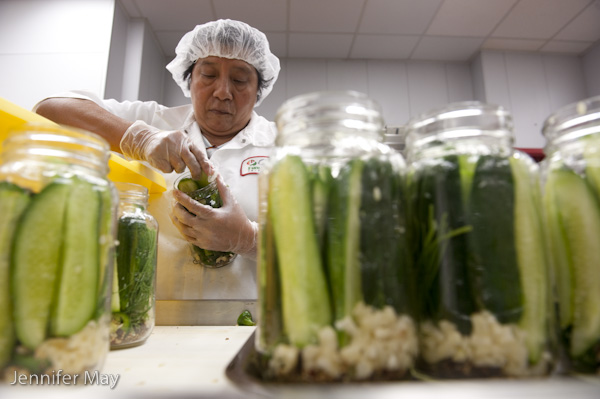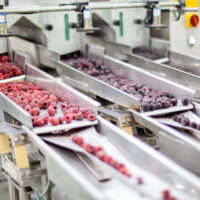If you are looking to grow your food brand, you have likely considered using a co-packer, also known as a contract manufacturer. Outsourcing your manufacturing to a specialized company may make sense, but it also may not. All co-packers are not created equal. As a startup you must understand what to look for in a manufacturer, how to manage your relationship and how to be a good client. Believe me, it is a two-way street.
I love the way I Heart Keenwah Ravi Jolly compares the role of a co-packer in a food startup to the role of a drummer in a band. “The co-packer is the driving force, the rhythm, the glue. Without a solid drummer, there is no band,” he says.
At Valor Foods, I’ve worked with co-packers in the United States and South America. Starting out, I made some rookie mistakes and learned a lot. I’ve even had to change co-packers because they weren’t a good fit for my project. Combining my experience along with a few colleagues, the following are my four essential tips for selecting and working with a co-packer.
1. Understand Why You Want to Work With a Co-Packer
Why do you want to work with a co-packer? Have you outgrown in-house production?
Most food startups begin in a non-commercial kitchen producing items in small batches. As your company grows, however, and you can no longer fulfill demand, you have to make a decision: do you invest in a larger production facility, or do you outsource to a co-packer?
Here are some reasons you may want to outsource your production:
Investing in a larger production facility comes with a lot of costs like equipment, rent, labor and certifications. Depending on your clientele, you may need additional quality control certifications like HACCP, Kosher and USDA Organic. Big box retailers require a ton of certifications in order to carry your product. This means a lot more money if you are starting a new facility, and is the main reason many startups turn to co-packers as they scale. A co-packer also saves you time, allowing you to focus on growing your business versus being stuck in the kitchen and managing a production facility.
2. Learn The Manufacturing Process
The more you understand the recipe, manufacturing process and equipment, the better you can work with your co-packer to produce the best possible product. While the co-packer will save you a lot of time, you still need to be proactive in the process.
Here are some tips for how to stay proactive:
A. Make sure you are there for the first couple of product runs and help solve the inevitable problems that arise.
B. Make sure you understand ingredient costs. Always get quotes from a bunch of ingredient manufacturers and wholesalers.
C. Depending on the availability and complexity of your ingredients, you may want to source some or all of the ingredients directly from manufactures as opposed to letting the co-packer purchase them. I Heart Keenwah now sources its own quinoa directly from Bolivia, for example, because it’s more cost effective.
D. Pay particular attention to the packaging. Make sure to think about the usability factor for your end-consumer.
3. A Co-Packer Is NOT Your Business Coach
The biggest challenge a startup faces when approaching a co-packer is low volume. A co-packer makes money from production runs. Their ideal clients have a steady stream of high volume production runs.
In the beginning, your startup is just a small fish in a very big pond. You have to convince the co-packer your product is great and has a lot of growth potential. So when you pitch a co-packer make sure you do your homework:
A. Confirm that they actually have the right equipment to make your product;
B. Have a projection and timeline of your production needs;
C. Have your recipe finalized and ingredients needs calculated; and
D. Learn the industry jargon.
That last one is particularly important. I remember being so intimidated on my first call with my co-packer, because I didn’t understand the industry jargon they used. For instance, the only when they asked me about packaging on our first call, I said: “I need the box that holds the smaller boxes”. Now I would say: “corrugated carton is the master pack”.
Like any good relationship, you must be clear about your needs and honest about your intentions.
As Thomas Schliep of TMS Advisors told me “co-packers are very conscious of ‘scope creep’,” which adds more work for the co-packer outside of the agreed upon process. “This will make you look inexperienced or even worse needy, neither will help your reputation.”
4. Trust Your Gut (and Get The Necessary Paperwork)
An ideal co-packer is a strategic partner for your business. You can grow together and enjoy shared success. Unfortunately, it can be difficult to find a co-packer that is the right fit, so you need to be ready to shop around for one that matches your needs. This is because co-packers vary in product specialties, location, certifications and minimum volumes. Also, as I discussed earlier, co-packers often prefer to work with larger companies, so if you’re a “small fish,” it can be difficult to get their attention.
Once you do find a co-packer that matches your product and needs, I always recommend getting references from satisfied clients. Above all else, as Caleb Simpson of Bearded Bros emphasized, you have to trust your gut. If your instincts tell you that the co-packer is “off”, you probably shouldn’t trust them. At the very least, proceed with caution.
Try to take precautions with NDAs and contracts, but realize that if you have success, someone will probably copy you. That said, Ravi if I Heart Keenwah recommends focusing on offense as opposed to defense, he explains: “I’d focus your efforts on building your brand, perfecting your packaging and scaling your operations as fast as you can.”
When it comes to working with a co-packer, if you start with a clear vision, understand the production process, foster a “win-win” environment and follow your instincts, you’re well on your way to building a successful relationship.







